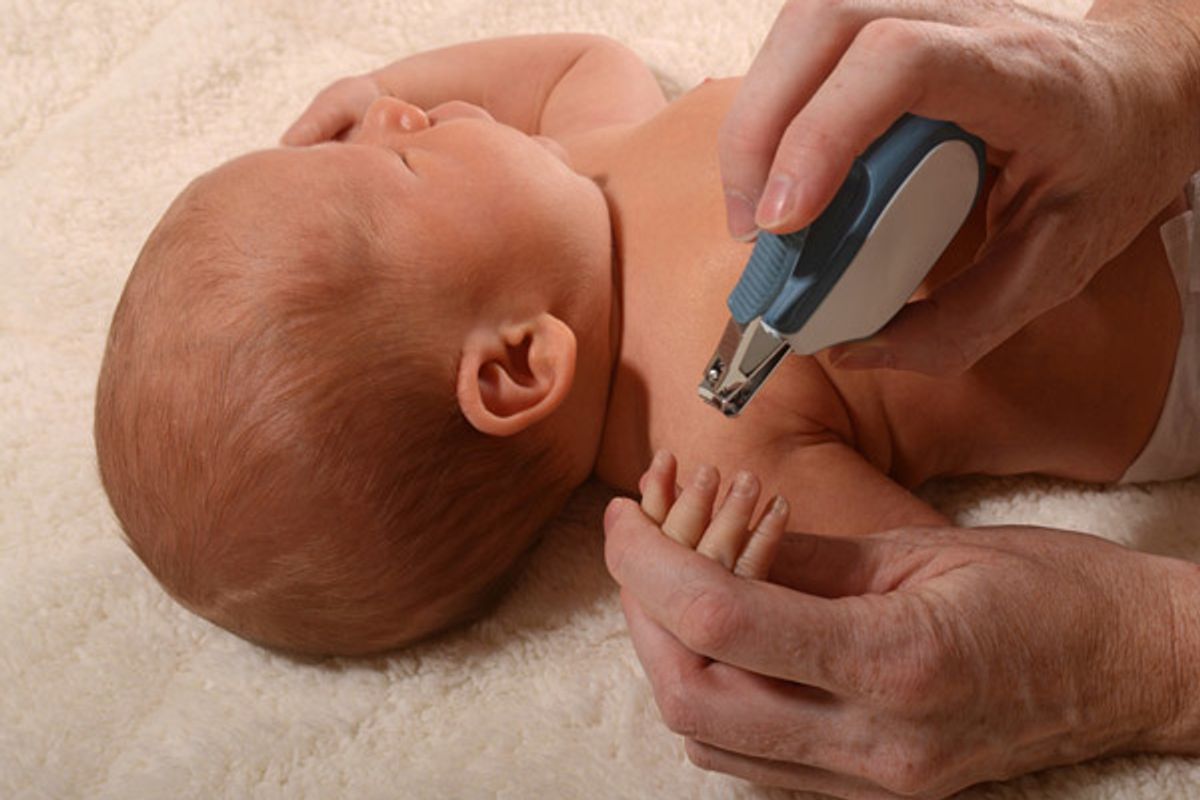Are you scared of clipping your baby's teeny-tiny nails? Even though your baby's nails are softer and more pliable than yours, they still can cause scratches and need trimming regularly.
A baby's fingernails grow fast, so you may have to trim them weekly or even more frequently. Toenails don't need cutting quite as often.
Here's how to do it safely and easily:
File them down
Filing your baby's nails with an emery board is the least difficult, safest way to do it, but it takes more time. And you must be careful not to file the tender skin under the nail bed. Don't use a metal nail file, which may be too rough for baby's skin.
Use a baby nail clipper
Clip your baby's nails as you would your own, gently pushing back the fingertip from the nail to allow space for the clipper. This helps prevent clipping your baby's finger. Short little clips above the white nail line will help prevent clipping too close. For toenails, clip straight across. Keep a firm hold on your child's hand (or foot) as you clip. You can also use scissor-shaped clippers or manicure scissors. Smooth rough edges with an emery board.
Clip while baby sleeps
Wait until your baby is sleeping to clip her nails. If you're lucky, she will sleep right through it. And she won't wiggle and squirm. Even if you're clipping while baby sleeps, make sure you have adequate light for the task.
Distract and relax
If you choose to trim your baby's nails while she's awake, try to distract her. When newborns are alert, they tend to clench their fists, tightening the gap between the fingertip and nail, which makes the process more difficult. Make sure you and your baby are as relaxed as possible. A good time is right after baby's bath, when she's relaxed and her nails are soft. If your baby tenses up, take a break and give her a chance to calm down. Singing a favorite song may help.
If you still don't have the courage (or the time) to clip your little one's nails, here are some alternatives:
Seek help
Ask a more seasoned parent to show you how they do it. Maybe this is a task for a grandparent or favorite aunt or uncle. A regular sitter or nanny also may be willing to do it. If you decide to do it yourself, you may want to ask your partner or a friend to hold your baby and keep her from wiggling too much while you work or to distract her while you do the clipping.
Put on the mittens
If baby's nails seem particularly sharp and you just can't clip them right now, put mittens on your baby's hands to prevent scratching, especially while she sleeps.
Some parents bite their baby's nails, but this is not recommended because it can introduce germs and leave baby's nails ragged, plus it's easy to bite into baby's soft flesh.
If the worst happens and you do nick a finger or toe, don't fret. Just rinse the cut with cool water and cover the cut with sterile gauze or cloth. Apply a little pressure and hold it briefly. The bleeding usually stops quickly. You can apply some antibiotic cream, but avoid bandages, which could cause your baby to choke.
View our editorial policy.
- 1https://www.healthywomen.org/content/article/new-moms-babies-are-leaving-maternity-wards-earlier-usual-due-coronavirus
- 2https://www.healthywomen.org/content/article/new-moms-babies-are-leaving-maternity-wards-earlier-usual-due-coronavirus
- 3https://www.healthywomen.org/content/article/when-moms-become-caregivers-tips-caring-sick-child
- 4https://www.healthywomen.org/content/article/when-moms-become-caregivers-tips-caring-sick-child







